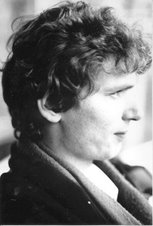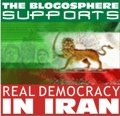
"What will that innocent lamb tell her friends when she grows up? My father is Barsam Tchakhmakhchian, my great-uncle is Dikran Stamboulian, his father is Varvant Istanboulian, my name is Armanoush Tchakhmakhchian, all my family tree has been Something Somethingian, and I am the grandchild of genocide survivors who lost all their relatives at the hands of Turkish butchers in 1915, but I myself have been brainwashed to deny the genocide because I was raised by some Turk named Mustafa! What kind of a joke is that!"
This passage, shouted out by one of the characters in The Bastard of Istanbul, is what got Elif Shafak in court for "insulting Turkishness", another case based on the by now infamous Article 301. The case against Shafak was eventually dropped, but she became well-known as one of the very few Turkish authors, together with for example Nobel Prize winner Orhan Pamuk, who was not afraid to tackle the issue of the Armenian genocide in a way that was not well appreciated (to put it mildly) by the Turkish authorities.
Armanoush is the child of an Armenian father and an American mother who remarried with a Turkish man. She divides her time between her mother in Arizona and her father's family in San Fransisco. When she feels something in her identity is missing, she sets off on a trip to Istanbul, to stay with her stepfather's family and find out more about her past. In Istanbul, she becomes fast friends with Asya, the youngest member of her stepfather's family.
The Armenian genocide is a major theme in the story, but eventually it is one of the ways the bigger theme of dealing with the past is worked out. All of the major characters have something in their past they have to deal with, either by accepting it or denying it or, even before acceptation or denial, by trying to find out what their past actually is.
The first chapter was hard to finish - I didn't like the writing style, very "flowering" with long sentences and many adjectives. I regularly had to reread a sentence to actually get the meaning. Fortunately, that was only the first chapter, after that I either got used to the language or the style changed (I guess it was a bit of both). Anyway, I got hooked and, having started the book on Saturday afternoon, had finished it Sunday before dinner.
It is a beautifully told story with an interesting plot, if somewhat constructed at times. I felt as if the author wanted to represent all the different opinions on the Armenian genocide in the book. There is the staunch Turkish nationalist who is absolutely convinced that there was no genocide and that, on the contrary, the Armenians killed the Turks en masse. There is the Turk who acknowledges that the Turks did horrible things to the Armenians during World War I, but that that was in the past and that the current generation is not responsible for it. There is also the Armenian who thinks that Armenians still living in Turkey are being repressed and who is convinced that they'd be better off emigrating. There is the somewhat skeptical Armenian who thinks that striving for recognition of the genocide is the only thing that still binds the Diaspora and that once recognition by Turkey has been achieved, the Diaspora will fall apart. Finally there is the Armenian who was born and raised in Istanbul, feels Istanbulite first and foremost and doesn't want to live anywhere else. This urge to represent all those opinions led to superfluous scenes and even characters in my opinion. I ended up quickly reading the superfluous parts and then diving back into the rest of the book.
There were already so many characters, major and minor, that at times, especially when the perspective changed for example from San Fransisco to Istanbul or from present to past or back, I had to try to remember who was who and what the relation's were between them. On the other hand, this extensive set of characters was also part of why I loved the book. I especially loved Asya's family with all their quirky characters. Armanoush initially started out as an interesting character as well, but soon I started finding her a bit bland, colorless, especially compared to colorful Asya and her equally colorful family.
I am not sure the book is among my favorite reads of this year, but I did enjoy it very much and am certainly interested in reading more by Elif Shafak.
This review is crossposted at The Armenian Odar Reads.




9 comments:
i read the book about a year ago, and honestly speaking, i didnt like it. my reasons are not regarding the story which deals with a rather delicate matter for turks. i definitely think that this is a very weak novel from the literature point of view.
and this is the link to my post which i mention about the book:
http://drexhsus.blogspot.com/2006/11/step-is-step.html
Myrthe, is the book translated in Dutch?
Never heard about the book.
Super Hero, fair enough. Though I didn't mention it in the review, I do think that if the book wouldn't have dealt with the Armenian genocide and if there wouldn't have been a court case on rather ridiculous grounds, the book would likely not have received the attention it did.
Geert Jan, the book has been translated into Dutch, the title is "De Bastaard van Istanboel" and it has been published by Uitgeverij de Geus. I knew it had been translated, but just did a quick search as to title and publisher.
Myrthe,
Excellent book review. Also SH, read your point of view. More reason to read the novel.
My favorite Novel of all Times is: the Dead of Angele Ducroux, by H. Marsman.
And some work of Isabelle Allende and Simone de Beauvoir.
Myrthe, there is a Dutch book: Lied van de Houtduif, a true story about my sister and her former lover (of VN) I am there as well..))
Happy Christmas Eve.
Myrthe,
I agree with Super Hero: it's a weak novel, and in fact you wrote the same. But I like your review, and Super Hero his as well.
It is a delicate and complex situation. When I read the first sentences of this entry, I was angry: Turks are no butchers, but yes, big and many mistakes are made in the past. I praise the fact that I see here people talking, with a different opinion about the issue, without screaming to each other. Thanks Super Hero for your insight: art can bring us together, not politicians or an army. Or some amazing ignorant bloggers and journalists.
I read this book last summer and enjoyed it. It summarizes well the conflicting narratives of the Armenians and the Turks. To paraphrase one of the characters in the book: 'The Turks have no history, and the Armenians have too much'.
It is interesting that almost all people who I discussed this book with or commented here or on this post on my litblog have the same objection to the book, that the urge to represent every different opinion from both sides is over-present. I also think that this urge made the book less than it could be. I think that the two cafe's and the character of Aram are superfluous. Their only function was to represent an opinion.
R, I like your quote. There might really be a grain of truth in there.
Hans, I will look for the book you mentioned. I have never read anything by Simone de Beauvoir, though I'd like to. As for Isabel Allende, I read most of her books about ten or fifteen years ago, but I didn't really care for them much. But I honestly don't remember exactly why they started irritating me. I do remember that I liked her shorter novels and stories better than the longer ones.
Young_activist, I am not sure I am the right person to answer your questions, as I don't live in Turkey.
Young_activist,
Censorship isn't pervasive in Turkey just yet but things can be and are blocked on the net (and it is done in a rather clumsy/ineffective fashion). Control of the internet by governments is the broader issue to talk about and that isn't limited to censorship but also includes licensure, monitoring, data retention, ID requirements and such. From that point of view no country is truly a bastion of freedom and many are getting worse. The reasons for the control vary from country to country (porn, political speech, copyright issues, terrorism, libel, gambling etc.).
There's a new Turkish law concerning internet publishing. It is a dangerous law for various reasons and was passed w/o much of a fuss or even much mention in the press (except they laid the groundwork for it by sustained coverage of child porn on the net). I talked about this elsewhere and somebody translated parts of the new law to English. I'll give you two links to those conversations, one is mainly about the broader issues, and the other has some talk about the new law. These are not an authoritative sources, of course.
Bulent, thanks for the informative comment.
I also want to add 'self cencorship', a common practice in Turkey.
Post a Comment